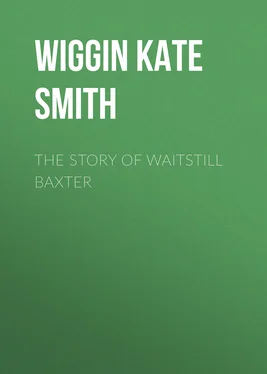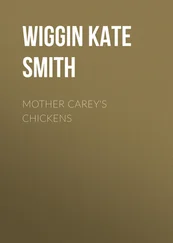Kate Wiggin - The Story of Waitstill Baxter
Здесь есть возможность читать онлайн «Kate Wiggin - The Story of Waitstill Baxter» — ознакомительный отрывок электронной книги совершенно бесплатно, а после прочтения отрывка купить полную версию. В некоторых случаях можно слушать аудио, скачать через торрент в формате fb2 и присутствует краткое содержание. Жанр: foreign_prose, literature_19, foreign_antique, на английском языке. Описание произведения, (предисловие) а так же отзывы посетителей доступны на портале библиотеки ЛибКат.
- Название:The Story of Waitstill Baxter
- Автор:
- Жанр:
- Год:неизвестен
- ISBN:нет данных
- Рейтинг книги:3 / 5. Голосов: 1
-
Избранное:Добавить в избранное
- Отзывы:
-
Ваша оценка:
- 60
- 1
- 2
- 3
- 4
- 5
The Story of Waitstill Baxter: краткое содержание, описание и аннотация
Предлагаем к чтению аннотацию, описание, краткое содержание или предисловие (зависит от того, что написал сам автор книги «The Story of Waitstill Baxter»). Если вы не нашли необходимую информацию о книге — напишите в комментариях, мы постараемся отыскать её.
The Story of Waitstill Baxter — читать онлайн ознакомительный отрывок
Ниже представлен текст книги, разбитый по страницам. Система сохранения места последней прочитанной страницы, позволяет с удобством читать онлайн бесплатно книгу «The Story of Waitstill Baxter», без необходимости каждый раз заново искать на чём Вы остановились. Поставьте закладку, и сможете в любой момент перейти на страницу, на которой закончили чтение.
Интервал:
Закладка:
“That wouldn’t make any difference, Cephas,” said Patty firmly, moving towards the front door as if to end the interview. “If I don’t love you UNlicked, I couldn’t love you any better licked, now, could I?—Goodness gracious, what am I stepping in? Cephas, quick! Something has been running all over the floor. My feet are sticking to it.”
“Good Gosh! It’s Mis’ Morrill’s molasses!” cried Cephas, brought to his senses suddenly.
It was too true! Whatever had been the small obstruction in the tap, it had disappeared. The gallon measure had been filled to the brim ten minutes before, and ever since, the treacly liquid had been overflowing the top and spreading in a brown flood, unnoticed, over the floor. Patty’s feet were glued to it, her buff calico skirts lifted high to escape harm.
“I can’t move,” she cried. “Oh! You stupid, stupid Cephas, how could you leave the molasses spigot turned on? See what you’ve done! You’ve wasted quarts and quarts! What will father say, and how will you ever clean up such a mess? You never can get the floor to look so that he won’t notice it, and he is sure to miss the molasses. You’ve ruined my shoes, and I simply can’t bear the sight of you!”
At this Cephas all but blubbered in the agony of his soul. It was bad enough to be told by Patty that she was “considering several,” but his first romance had ended in such complete disaster that he saw in a vision his life blasted; changed in one brief moment from that of a prosperous young painter to that of a blighted and despised bungler, whose week’s wages were likely to be expended in molasses to make good the Deacon’s loss.
“Find those cleaning-cloths I left in the hack room,” ordered Patty with a flashing eye. “Get some blocks, or bits of board, or stones, for me to walk on, so that I can get out of your nasty mess. Fill Bill Morrill’s jug, quick, and set it out on the steps for him to pick up. I don’t know what you’d do without me to plan for you! Lock the front door and hang father’s sign that he’s gone to dinner on the doorknob. Scoop up all the molasses you can with one of those new trowels on the counter. Scoop, and scrape, and scoop, and scrape; then put a cloth on your oldest broom, pour lots of water on, pail after pail, and swab! When you’ve swabbed till it won’t do any more good, then scrub! After that, I shouldn’t wonder if you had to fan the floor with a newspaper or it’ll never get dry before father comes home. I’ll sit on the flour barrel a little while and advise, but I can’t stay long because I’m going to a picnic. Hurry up and don’t look as if you were going to die any minute! It’s no use crying over spilt molasses. You don’t suppose I’m going to tell any tales after you’ve made me an offer of marriage, do you? I’m not so mean as all that, though I may have my faults.”
It was nearly two o’clock before the card announcing Deacon Baxter’s absence at dinner was removed from the front doorknob, and when the store was finally reopened for business it was a most dejected clerk who dealt out groceries to the public. The worst feature of the affair was that every one in the two villages suddenly and contemporaneously wanted molasses, so that Cephas spent the afternoon reviewing his misery by continually turning the tap and drawing off the fatal liquid. Then, too, every inquisitive boy in the neighborhood came to the back of the store to view the operation, exclaiming: “What makes the floor so wet? Hain’t been spillin’ molasses, have yer? Bet yer have! Good joke on Old Foxy!”
X. ON TORY HILL
It had been a heavenly picnic the little trio all agreed as to that; and when Ivory saw the Baxter girls coming up the shady path that led along the river from the Indian Cellar to the bridge, it was a merry group and a transfigured Rodman that caught his eye. The boy, trailing on behind with the baskets and laden with tin dippers and wildflowers, seemed another creature from the big-eyed, quiet little lad he saw every day. He had chattered like a magpie, eaten like a bear, is torn his jacket getting wild columbines for Patty, been nicely darned by Waitstill, and was in a state of hilarity that rendered him quite unrecognizable.
“We’ve had a lovely picnic!” called Patty; “I wish you had been with us!”
“You didn’t ask me!” smiled Ivory, picking up Waitstill’s mending-basket from the nook in the trees where she had hidden it for safe-keeping.
“We’ve played games, Ivory,” cried the boy. “Patty made them up herself. First we had the ‘Landing of the Pilgrims,’ and Waitstill made believe be the figurehead of the Mayflower. She stood on a great boulder and sang:—
‘The breaking waves dashed high
On a stern and rock-bound coast’—
and, oh! she was splendid! Then Patty was Pocahontas and I was Cap’n John Smith, and look, we are all dressed up for the Indian wedding!”
Waitstill had on a crown of white birch bark and her braid of hair, twined with running ever-green, fell to her waist. Patty was wreathed with columbines and decked with some turkey feathers that she had put in her basket as too pretty to throw away. Waitstill looked rather conscious in her unusual finery, but Patty sported it with the reckless ease and innocent vanity that characterized her.
“I shall have to run into father’s store to put myself tidy,” Waitstill said, “so good-bye, Rodman, we’ll have another picnic some day. Patty, you must do the chores this afternoon, you know, so that I can go to choir rehearsal.”
Rodman and Patty started up the hill gayly with their burdens, and Ivory walked by Waitstill’s side as she pulled off her birch-bark crown and twisted her braid around her head with a heightened color at being watched.
“I’ll say good-bye now, Ivory, but I’ll see you at the meeting-house,” she said, as she neared the store. “I’ll go in here and brush the pine needles off, wash my hands, and rest a little before rehearsal. That’s a puzzling anthem we have for to-morrow.”
“I have my horse here; let me drive you up to the church.”
“I can’t, Ivory, thank you. Father’s orders are against my driving out with any one, you know.”
“Very well, the road is free, at any rate. I’ll hitch my horse down here in the woods somewhere and when you start to walk I shall follow and catch up with you. There’s luckily only one way to reach the church from here, and your father can’t blame us if we both take it!”
And so it fell out that Ivory and Waitstill walked together in the cool of the afternoon to the meeting-house on Tory Hill. Waitstill kept the beaten path on one side and Ivory that on the other, so that the width of the country road, deep in dust, was between them, yet their nearness seemed so tangible a thing that each could feel the heart beating in the other’s side. Their talk was only that of tried friends, a talk interrupted by long beautiful silences; silences that come only to a man and woman whose understanding of each other is beyond question and answer. Not a sound broke the stillness, yet the very air, it seemed to them, was shedding meanings: the flowers were exhaling a love secret with their fragrances, the birds were singing it boldly from the tree-tops, yet no word passed the man’s lips or the girl’s. Patty would have hung out all sorts of signals and lures to draw the truth from Ivory and break through the walls of his self-control, but Waitstill, never; and Ivory Boynton was made of stuff so strong that he would not speak a syllable of love to a woman unless he could say all. He was only five-and-twenty, but he had been reared in a rigorous school, and had learned in its poverty, loneliness, and anxiety lessons of self-denial and self-control that bore daily fruit now. He knew that Deacon Baxter would never allow any engagement to exist between Waitstill and himself; he also knew that Waitstill would never defy and disobey her father if it meant leaving her younger sister to fight alone a dreary battle for which she was not fitted. If there was little hope on her side there seemed even less on his. His mother’s mental illness made her peculiarly dependent upon him, and at the same time held him in such strict bondage that it was almost impossible for him to get on in the world or even to give her the comforts she needed. In villages like Riverboro in those early days there was no putting away, even of men or women so demented as to be something of a menace to the peace of the household; but Lois Boynton was so gentle, so fragile, so exquisite a spirit, that she seemed in her sad aloofness simply a thing to be sheltered and shielded somehow in her difficult life journey. Ivory often thought how sorely she needed a daughter in her affliction. If the baby sister had only lived, the home might have been different; but alas! there was only a son,—a son who tried to be tender and sympathetic, but after all was nothing but a big, clumsy, uncomprehending man-creature, who ought to be felling trees, ploughing, sowing, reaping, or at least studying law, making his own fortune and that of some future wife. Old Mrs. Mason, a garrulous, good-hearted grandame, was their only near neighbor, and her visits always left his mother worse rather than better. How such a girl as Waitstill would pour comfort and beauty and joy into a lonely house like his, if only he were weak enough to call upon her strength and put it to so cruel a test. God help him, he would never do that, especially as he could not earn enough to keep a larger family, bound down as he was by inexorable responsibilities. Waitstill, thus far in life, had suffered many sorrows and enjoyed few pleasures; marriage ought to bring her freedom and plenty, not carking care and poverty. He stole long looks at the girl across the separating space that was so helpless to separate,—feeding his starved heart upon her womanly graces. Her quick, springing step was in harmony with the fire and courage of her mien. There was a line or two in her face,—small wonder; but an “unconquerable soul” shone in her eyes; shone, too, in no uncertain way, but brightly and steadily, expressing an unshaken joy in living. Valiant, splendid, indomitable Waitstill! He could never tell her, alas! but how he gloried in her!
Читать дальшеИнтервал:
Закладка:
Похожие книги на «The Story of Waitstill Baxter»
Представляем Вашему вниманию похожие книги на «The Story of Waitstill Baxter» списком для выбора. Мы отобрали схожую по названию и смыслу литературу в надежде предоставить читателям больше вариантов отыскать новые, интересные, ещё непрочитанные произведения.
Обсуждение, отзывы о книге «The Story of Waitstill Baxter» и просто собственные мнения читателей. Оставьте ваши комментарии, напишите, что Вы думаете о произведении, его смысле или главных героях. Укажите что конкретно понравилось, а что нет, и почему Вы так считаете.












